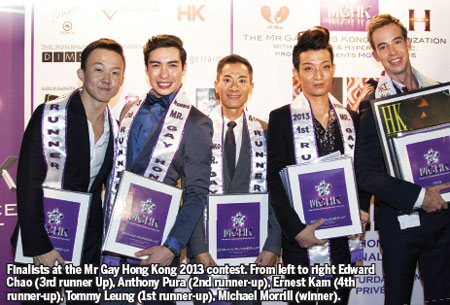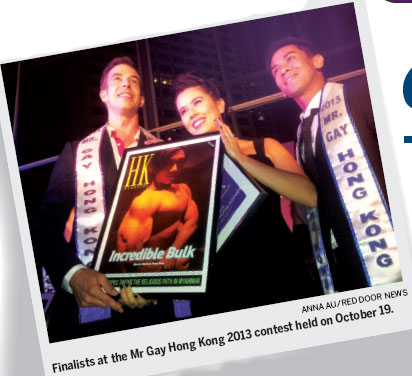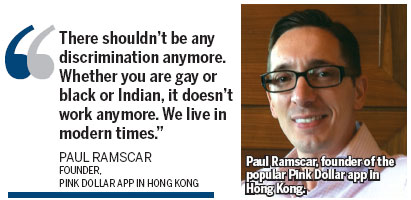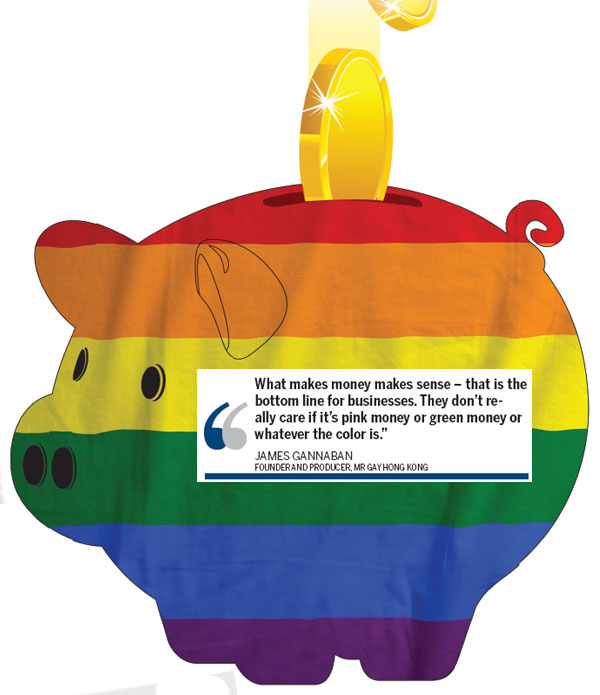Businesses learn to think pink
Updated: 2013-10-25 06:53
By Simon Parry(HK Edition)
|
|||||||
Businesses ranging from hotels and fashion houses to banks, insurance companies and wealth managers are waking up to the power of the 'Pink Dollar' and wooing Hong Kong's affluent gay community - and their efforts may help bring about broader social change, campaigners believe. Simon Parry reports.
When schoolteacher Michael Morrill was crowned Mr Gay Hong Kong in front of more than 400 guests at a colorful party on the terrace of Giorgio Armani's Armani/Prive club six days ago (Oct 19), a line-up of elite corporate sponsors applauded his success.
As well as the prestigious fashion house that hosted the event, partners for the event included Air Canada, Now TV, the Italian wine specialist Valdivia, and celebrity outfitter Sam's Tailor, which provided formal wear outfits for each of the five finalists.
The glitzy contest - which saw US native Mr Morrill chosen to represent Hong Kong at the 2014 Mr Gay World finals in Rome - was a far cry from the first event of its kind, funded on a relative shoestring and attended by a far smaller crowd at a bar in Lan Kwai Fong.
And the pomp and circumstance of last Saturday's final, where guests included diplomats and celebrities, reflects an increasing desire by the business community to embrace customers among what is known as the LGBT (Lesbian, Gay, Bisexual and Transgender) community.
It makes sound business sense of course: They account for an estimated 10 per cent of the city's population and, largely unshackled by the expense of children, the professional couples among them have considerable spending power.
Liberal attitude
While Hong Kong remains conservative in its attitudes to homosexuality, with no legislation in prospect allowing for same-sex unions and many gay people still afraid to "come out" to family and workmates, businesses are far more liberal in their attitudes.
A Pink Dollar app launched a year ago to list gay-friendly businesses has signed up more than 100 companies and is in talks to add a major five-star hotel to its ranks, along with banks and an insurance company considering offering life insurance policies for same-sex couples.
For James Gannaban, founder and producer of Mr Gay Hong Kong, having the clout of international brands like Armani added to the spice of the annual gala - but in the longer term may exert pressure for a broader change in attitudes.
"Once businesses notice the power harnessed by the pink dollar, they start to pay attention," he said. "What makes money makes sense - that is the bottom line for businesses. They don't really care if it's pink money or green money or whatever the color is.
"As far as we are concerned, if there is an opportunity for business to hold the hand of legislators in this case and show them that there is nothing to fear, that is all for the good."
The pizzazz of the Mr Gay Hong Kong 2013 final came days after the first anniversary of the Pink Dollar smart phone app, created by British expatriate Paul Ramscar, which has unearthed some surprising business sectors wanting to woo the gay community.
He is in talks with two high-profile five-star hotels and says at least one of them looks certain to put its name on the Pink App - something he believes will make a "big difference" for visiting same-sex couples.
"They will be able to go to a hotel knowing it is gay friendly and they won't be put into a situation where the reception staff ask 'Do you want separate beds?' or 'Is there a mistake with the booking? We've got you as having one room'," he said.
Already, one hotel chain in Macao was adopting gay-friendly measures that Ramscar said he hoped Hong Kong hotels would follow. "If they get a booking for a male couple they actually put 'his and his' bathrobes and slippers in the rooms," he said.
Banks and insurance companies too are taking an interest and may soon be offering services to same-sex partners through the Pink Dollar app that put them in a field of their own in Asia. There are even talks about a Pink Dollar-affiliated credit card.
"I've had a lot of discussions with one major bank and they are not coming on board just yet," Ramscar said. "They have said to me it is because they are not so sure they can tailor their products to this market. I said to them 'You've probably already got half a million gay customers in Hong Kong. What's to tailor?'
"I've also been speaking to an insurance couple about a same-sex couple life insurance plan and we are pretty far down the track now of getting it approved and that would be quite significant for Hong Kong because it's never been done before.
"It's been done in the UK for many years almost coming up to three decades. We have had loads of discussions with a major insurer in Hong Kong. They are now putting it through legal department and internal processes, and that is going to be big for the LGBT community."
Barclays was already very supportive of the LGBT community, he said. "This community remembers who supports them," he said. "I would love to have a local bank come on board soon. If they come on board they will be the winner."
By listing themselves on the Pink Dollar app, businesses were able to tap into the LGBT market indirectly through a trusted medium, avoiding direct approaches to the gay community which Ramscar said "has backfired in some cases".
"That demographic have said 'Why are you approaching me now? Why are you suddenly zooming in on me and doing your marketing to me as a member of LGBT sector?' We provide a platform for businesses to get on the radar with this audience," he said.
Food intentions
Ramscar said he believed the intentions of most businesses were good when they applied to be listed on the Pink Dollar app. "I go and meet all the businesses myself one to one," he said. "We have a lot of requests from businesses to just come on board and some we turn down.
"We don't want to add every single tailor in town for example. We added one of the most prolific tailors, Sam's Tailor. They regularly have ex-presidents and pop stars as customers. They are on board and they absolutely love Pink Dollar and they love this community and they have been very, very supportive."
However, the changes in attitudes in the business sector do not yet reflect society as a whole, he believes. "Attitudes are changing slowly but until something is done at a higher level - at government level - it will be much the same for the next 10 to 20 years," Ramscar said.
"I would like to see same-sex civil partnerships. We know of people in the community who have come to Hong Kong with their partners and left because they think 'Why should we stay here? It's not as free and open as it is in the UK or the US'. That's not good for Hong Kong.
"There shouldn't be any discrimination anymore. Whether you are gay or black or Indian, it doesn't work anymore. We live in modern times."
The winner of Mr Gay Hong Kong, meanwhile, is a man with a mission. "He ran on a very powerful platform of exposing the struggling and inequalities of people living with HIV, as he has been himself," Gannaban explained. "For us to have an ambassador like him in this position is quite special to us.
"Mr Gay Hong Kong isn't just a beauty pageant. It's an opportunity for us to deliver messages like Michael's or positive message like Tommy's, the first runner up. When Tommy was asked by judges who is the sexiest man in the world and he said 'my father'.
"That showed how there is today a generation of young gay Chinese men who have affirming experiences of coming out, and these are the stories that need to come out. We are not just a bunch of angry people railing against injustice. There is a reason we're called gay - it's because we're happy."




(HK Edition 10/25/2013 page4)